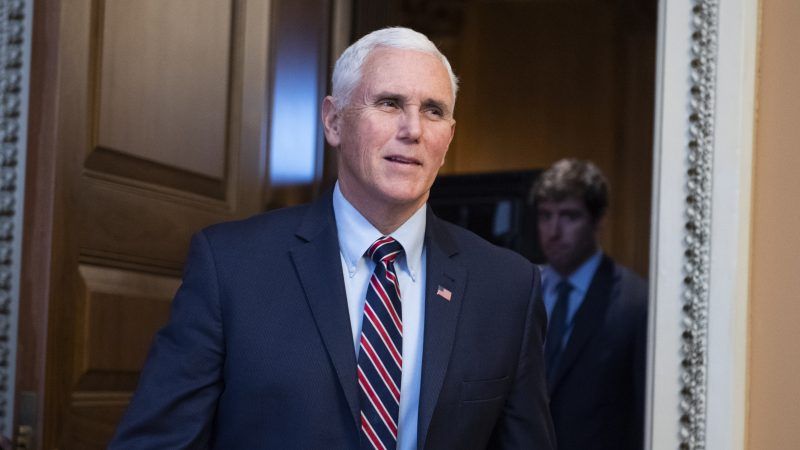Don't Believe Mike Pence's Spin About Iran and 9/11
The vice president says assassinated Iranian general Qasem Soleimani was involved in the September 11 plot. That's as true as when Republicans said Saddam Hussein was.

In October 2002, when the United States was on the brink of entering a disastrous war in Iraq, a congressman named Mike Pence stood up on the floor of House of Representatives to denounce the television networks for refusing to cover President George W. Bush's address outlining the case for war.
The Indiana Republian was referring to an October 7, 2002, speech that Bush delivered in Cincinnati, Ohio. In it, the president argued that Saddam Hussein's Iraqi regime "possesses and produces chemical and biological weapons. It is seeking nuclear weapons. It has given shelter and support to terrorism."
While CNN and other cable news outlets covered the speech, the major networks did not. That infuriated Pence. And so he denounced "CBS, ABC, and NBC for the total abdication of their public duty in refusing to broadcast the president's address to America in this hour of national need."
"Rather than the status of the Iraqi nuclear weapons system, The King of Queens [was] on CBS," Pence continued. "Rather than telling the American people of Iraqi complicity with terrorism, The Drew Carey Show aired on ABC."
I don't know whether those network executives were right or wrong to pick Kevin James and Drew Carey over Bush and Saddam that October night, but hindsight tells us that Bush was wrong about Iraq's nuclear weapons program. And the 9/11 Commission—which unfortunately would not finish its report until mid-2004, a year after the U.S. launched its ill-conceived invasion of Iraq—ultimately concluded that there was no secret connection between Saddam and Al Qaeda.
These days, Pence is vice president; and these days, whether or not the broadcast networks are helping you, it's easier to use social media to peddle pro-war propaganda. And that's exactly what Pence did this weekend, dusting off the Iraq playbook to argue that an American airstrike that killed Iranian general Qasem Soleimani was totally justified because 9/11.
Soleimani was plotting imminent attacks on American diplomats and military personnel. The world is a safer place today because Soleimani is gone.
— Mike Pence (@Mike_Pence) January 3, 2020
There is no good reason to believe this is true. (And that goes as well for his follow-up claim about Soleimani plotting "imminent attacks"—more on that here.)
The most obvious problem with Pence's claim is that 19 terrorists carried out the 9/11 attacks, not 12. We'll be charitable and assume that was a typo. The 9/11 Commission established that between eight and 10 of the 9/11 hijackers traveled through Iran to get to Al Qaeda training facilities in neighboring Afghanistan. That is, presumably, the straw that Pence is grasping for here.
But the report does not link Soleimani or anyone else in the Iranian regime to the plot. In fact, Soleimani's name is never mentioned in the commission's 1,200-page final report.
Here's what the report does say about Iran's involvement—or lack thereof:
We have found no evidence that Iran or Hezbollah was aware of the planning for what later became the 9/11 attack. At the time of their travel through Iran, the Al Qaeda operatives themselves were probably not aware of the specific details of their future operation.
The 9/11 hijackers—like Al Qaeda frontman Osama bin Laden—were mostly Saudi nationals. Saudi Arabia and Iran are arch rivals, and much of the post-9/11 chaos in the Middle East is due to those two regional powers jockeying for leverage against one another. Iran, run by hard-line Shiite Muslims, is unlikely to forge an alliance with Al Qaeda, a Sunni group with ties to Saudi Arabia. Indeed, after the attacks Iran actively helped the U.S. round-up members of Al Qaeda, including bin Laden's son.
Writing at National Review, David Harsanyi argues that Pence's interpretation of the facts surrounding 9/11 is "mostly right" because Iran has backed other terrorist groups, including Hamas, run by Sunni Muslims. But Harsanyi has to concede that there is "no hard evidence that Soleimani himself was involved" in 9/11, and he admits that the "commission could unearth no evidence proving that the Iranians knew what the 9/11 team was planning (which doesn't mean they did not)."
Mostly right? No. These arguments do not support Pence's expansive claims, and they certainly shouldn't convince anyone to go to war. If anything, that kind of Bush-era connect-the-dots-to-9/11 logic should make Americans more skeptical of the administration's case for war with Iran, because it is exactly the same playbook—sometimes even using the exact same players—that led the country into the Iraq quagmire.
Needless to say, the fact that Soleimani wasn't involved in plotting 9/11 does not absolve him from a history of plotting attacks that did kill and maim hundreds of Americans, among others. But the question we should be asking is whether killing him keeps Americans safer. By escalating the threat of war, it does not do that at all.
Meanwhile, most of those deadly attacks were only possible because the targets were Americans in Iraq—and those Americans were in Iraq, at least in part, because Mike Pence was wrong about whether to go to war nearly two decades ago. He's wrong again now.


Show Comments (143)